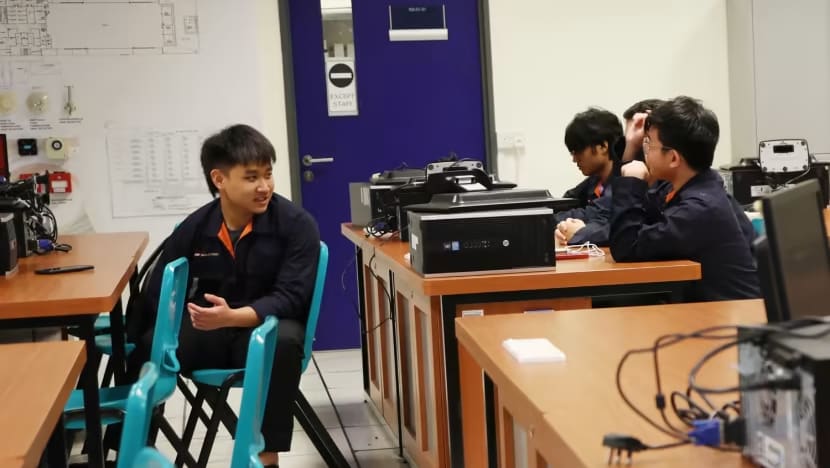ITE students hope for more help in Budget 2024 to improve employability, career trajectories
While the real median gross starting pay of ITE graduates has increased by S$310 over the last decade when adjusted for inflation, the segment still earns half of what their university peers do.


This audio is generated by an AI tool.
SINGAPORE: Students from the Institute of Technical Education (ITE) may soon be able to get industry-recognised certification while still in school, making them more employable even before graduation.
It is part of ITE’s efforts to help its students be more recognised for their skills before they fully enter the workforce.
The institute hopes such industry qualifications can give the students an edge beyond their academic qualifications alone, and is part of continued efforts to improve their career progression.
The topic is expected to be on the agenda when Deputy Prime Minister and Finance Minister Lawrence Wong announces this year’s national Budget on Friday (Feb 16).
Last year, the government said it was looking into providing Central Provident Fund (CPF) top-ups for ITE graduates, to help them afford homes and save for retirement.
It was part of the nation's Forward Singapore report released in October last year, which sought to understand what Singapore society values and wants for the next decade and beyond.
INDUSTRY CERTIFICATION
Among the ITE students hoping to benefit from such a policy is 20-year-old Kalyisah Adlina Nuruddin, who is pursuing a Higher Nitec in Human Resource and Administration in ITE College East.
She plans to enrol in a polytechnic to earn a diploma after graduating later this year.
"It's very crucial and important to have that paper qualification because it will be easier for you to step up in the future in the workforce,” Ms Kalyisah told CNA.
“It may take time for you to climb up without having the proper skill sets."

To help students who may not have the means to further their studies before joining the workforce, ITE is exploring ways for them to earn industry certification while still studying.
Dr Eric Cheung, senior director of ITE’s Curriculum and Educational Development Division, told CNA that apart from just attaining an ITE qualification, some students could actually be sponsored by private companies, or even by ITE itself, to pursue external industry certifications.
“This is kind of a recognition of the skills as well, not only from the academic perspective, (but) they are also recognised by the industrial standards,” he explained.
GROWTH TRAJECTORIES
Ensuring career progression for ITE graduates in the five or 10 years after leaving school is just as important, sociology professor Paulin Tay Straughan from the Singapore Management University’s School of Social Sciences told CNA.
That would ensure they keep up with the rest of their peers graduating from other academic institutions, she said.
Heart of the Matter: Do university graduates deserve to be paid double that of ITE grads?

“For somebody, for example, who graduates from ITE, and they are playing an important role in servicing a particular aspect of the industry, what is their growth trajectory? Not just in terms of gaining a diploma, but also practical skills, and where they can advance to,” she said.
“Particularly within hierarchies, do we have artificial ceilings, where we say that unless you are a degree holder, you cannot hold management positions? Perhaps that's a little bit outdated. Given the kind of leadership skills that you have, does it necessarily always tie to a degree qualification? I don't think so.”
Professor Straughan also emphasised that practical experience counts just as importantly as academic qualifications in certain settings.
Another aspect which could affect how valued ITE graduates feel in society is salary levels, she added.
While the real median gross starting pay of ITE graduates has increased by S$310 (US$231) over the last decade when adjusted for inflation, the segment still earns half of what their university peers do, according to graduate employment surveys.

















